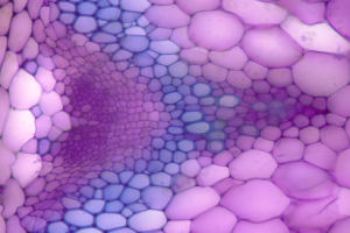Nov 15 2012
Scientists at The University of Manchester have identified how a plant hormone can affect the rate of cell division in vascular tissue in plants. The findings demonstrate how the hormone controls plant growth to produce more biomass which could be used to make the next generation of biofuels.

Vascular tissue is responsible for providing structural support to plants; for example wood is made up of specialised vascular cells. It’s made by a group of dividing cells present in a structure called the procambium. But how cell division is controlled is poorly understood.
Professor Simon Turner and Dr Peter Etchells from the Faculty of Life Sciences carried out a number of experiments using the gaseous plant hormone ethylene.
Arabidopsis plants were treated with ethylene which resulted in genes promoting cell division in the procambium being switched on. The team also found that cell division happened earlier in plants exposed to ethylene.
Professor Turner says: “It’s well documented that ethylene can increase plant growth, but what has not been identified before is how it affects cell division. This is what we wanted to identify, particularly with the benefits this knowledge could bring to the development of biofuels.”
The team also found that ethylene signalling interacts with PXY, a gene which has been identified as being essential for coordinated cell divisions in the procambium.
Despite the importance of PXY signalling for promoting vascular cell division, the scientists found that plants that are PXY mutants showed limited reduction in the rate of cell division during the experiments. This was down to the up-regulation of an ethylene pathway that increases the plant’s response to the hormone. Overall the results demonstrate that the interaction between ethylene and PXY signalling is responsible for maintaining the plant vascular system.
Dr Etchells says: “Understanding the events that occur in the procambium may help us to understand how we can best utilise plants for increased plant biomass which could be used for biofuel or wood production. It may be possible to manipulate how much vascular tissue can be produced by increasing the number of cells dividing. This in turn would lead to an increase in biomass.”
The next stop for the scientists will be to try to increase the growth of vascular tissue in trees through manipulating the division of cells.
Professor Turner believes this could have lasting benefits: “If we can increase the growth rate of wood then it would be possible to provide more plant biomass for use in creating biofuels. The fact that the material can come from a tree rather than a food source, such as maize, would reduce the demand on the world’s already overstretched crops.”
The research has been published in the journal PLOS Genetics.